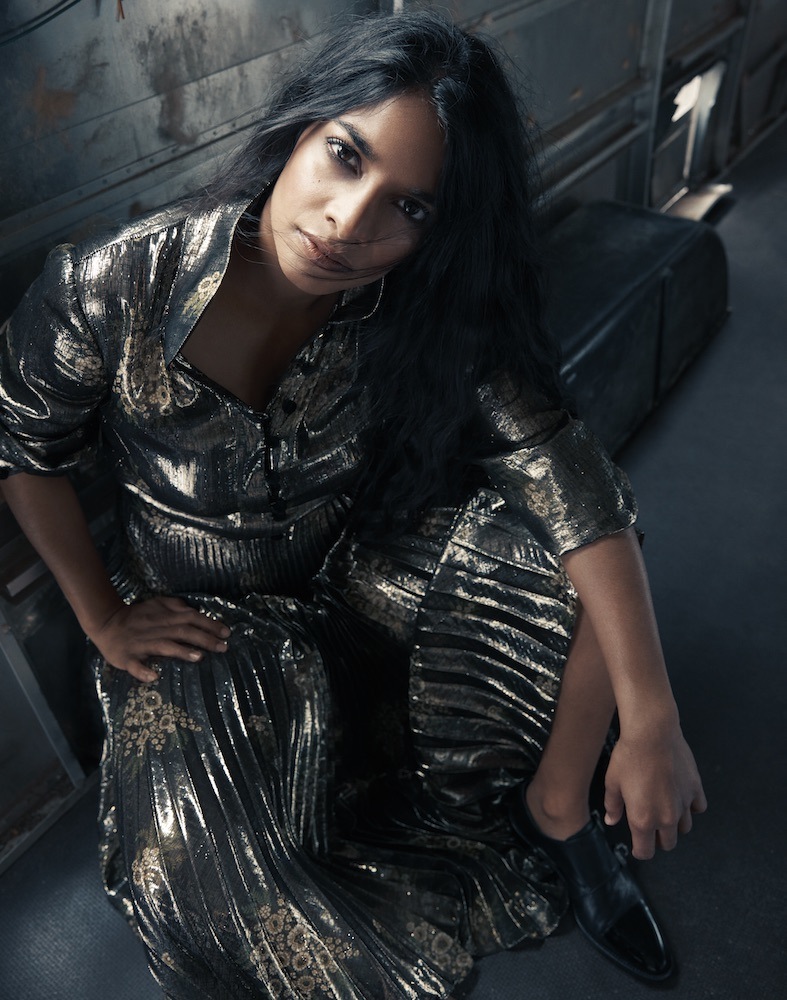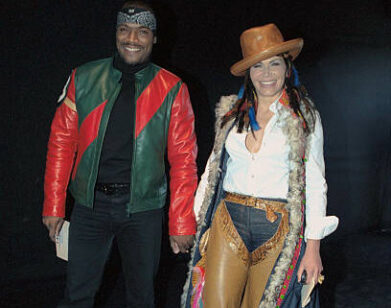Amara Karan
AMARA KARAN IN LONDON, JULY 2016. PHOTOS: MATT HOLYOAK/KAYTE ELLIS AGENCY. STYLING: NATALIE WANSBROUGH-JONES. HAIR: MAKI TANAKA USING BUMBLE AND BUMBLE. MAKEUP: AKGUN MANISALI/THE LONDON STYLE AGENCY USING CHANEL. PHOTO ASSISTANT: LUKE WELLER. RETOUCHING: THE SHOEMAKER’S ELVES.
In the third episode of HBO’s gripping drama The Night Of, a new character is introduced. Played by British actor Amara Karan, Chandra is an articulate, thoughtful young associate brought on to help defend a man accused of murder. Her involvement in the case is a little unusual; such high profile trials are generally reserved for partners with corner offices, not junior lawyers in cubicles. But the defendant, Nasir “Nas” Khan (Riz Ahmed), is of Pakistani descent and Chandra, raised in Baltimore, has family ties to Mumbai, India. In the eyes of Chandra’s white-shoe law firm, the connection is “close enough.”
Adapted from the 2009 British series Criminal Justice, The Night Of is a highly ambitious show. Over the course of eight episodes, the series touches on race, social class, and the aftermath of 9/11; the failures of the American prison system; and the parameters of humanity. “We need to know whether Nas is guilty,” says Karan over the phone. “But irrespective of if Nas is guilty or innocent, what are we doing to him? How has he got here? What are his parents doing? Why does he have this racist abuse shouted at him at the beginning of the show? It’s an interesting world that he’s existing in. It’s a sad world,” she continues. “The show makes me look at the care we need to take in terms of building a fair society and bringing rich people into the world.”
Born and raised in London, Karan studied politics, philosophy, and economics at Oxford University and spent a year working in finance before applying to drama school. Within days of wrapping The Night Of in New York, she returned to London to play a detective on the British series Stan Lee’s Lucky Man. When we speak over the phone, she is on set filming the Stan Lee‘s second season.
EMMA BROWN: Did you act in school plays when you were growing up?
AMARA KARAN: I did. I was always involved in plays and theater.
BROWN: Did you get good feedback?
KARAN: I did notice that I was getting cast in the lead roles in school plays. I also auditioned for a theater company outside of school, and I did get to go to the Edinburgh Festival with that when I was 16. I got an inkling—at university as well—where all these people auditioned for parts and I was getting parts. I felt like I had an instinct for it. I also really enjoyed it.
BROWN: What was your first leading role?
KARAN: That must have been [Reverend Samuel] Parris in The Crucible. Maybe it was Prospero in The Tempest. That was a lot of lines. It was classic plays like that. I went to a girls’ school and I was always being cast as the leading guys. I did the National Youth Theatre when I was younger as well. I was doing a lot of drama outside of school where I got to play females, and then in school I was like, “Ugh, I’m the man again!”
BROWN: Did that bother you?
KARAN: It did a little bit. I was like, “Am I that masculine?” [But] I loved the parts. I knew I was getting really good parts so I didn’t complain. No one was going to have any sympathy. I did think, “If I auditioned as an actress would I get any female parts? Do I have a really low voice—is that why I’m always cast as the male part?” But then I got over it.
BROWN: When you’re starting out as an actor, how do you balance doing projects you feel good about and believe in with just working and getting experience?
KARAN: That’s the key thing. In an ideal world, you want to do things that you think are really worthwhile. In my case, I guess if I’m not passionate about something, I just won’t get the part. That’s what I’ve found out. I think if I’m not really excited, I’m a bit lazy. I have to be pretty motivated these days to really go and work. I have done a lot of work now; a lot of work is coming my way and that attitude has paid off to get me to this stage.
BROWN: Was there one project in particular that really opened doors for you?
KARAN: The Darjeeling Limited. I noticed when that film came out—also I was in St. Trinian’s at the same time—the scripts were flooding in from America. It was a really cool, interesting time. It was a huge international platform. That film is shot in an exotic country and it was released all around the world, but it’s got Americans in it, and it’s got a fantastic script and story behind it. Like The Night Of, which I feel will do [the same] for me again. People all around the world can invest in this story. Even though it’s very quintessentially New York, American, there’s so much in it for all of us to invest in.
BROWN: I’ve got to say, I’ve watched the first seven episodes of The Night Of and I have no idea how it can get wrapped up in just one more episode.
KARAN: Yes, I know. It does feel like there’s a lot to wrap up. I’ve heard from one of the producers Jane Tranter that it’s pretty… emotional. I can’t wait. I too haven’t seen Episode Eight, but obviously I read the script. I got to speak to Jane in London and she said it was one of the best endings in television. I cannot wait for everyone to see it. I think it’s got to be a powerful ending—[Jane] doesn’t normally boast about things. She’s usually very direct with what she thinks. She was very moved by it.
BROWN: Had you met Riz Ahmed before you auditioned for The Night Of?
KARAN: Riz and I went to Oxford University together. We knew each other from university, which was incredible. We sort of followed each other’s careers. It was really weird that we were together for the first time like this, playing these parts, and we were both doing American accents. It was really cool that we had that connection. I think that also helped with our chemistry and our dynamic.
BROWN: What sort of research did you have to do for Chandra? Did you look at any court cases?
KARAN: The interesting thing about our show is that it shows that prisoners who haven’t even been charged—they haven’t been found guilty of their crime—are held in a really dangerous place, Rikers in New York, while the court case is being arraigned. In that time, the prosecution and defense lawyers are expected to negotiate and stop a court case from having to happen, because that’s very expensive. There’s a negotiation about pleading guilty to a lesser crime and getting only a few years, and that means that we don’t have to go to court. We see those scenes, and, in that time, we obviously see the character of Nas becoming criminalized and involved in all these gangs and all this violence. The director wanted me to see how the arraignment process, which is pleading bail in front of a judge, happens in court. It’s very matter-of-fact; it’s like horse-trading. He wanted me to see how that works and the culture of it, and the fact that everybody knows each other—the lawyers know each other, the judges know the criminals, the criminals know the lawyers. It’s a club. He wanted me to investigate that part, because that’s quite new in our show, I think.
BROWN: I worked for a lawyer briefly. I went to bankruptcy court with him and I was definitely the only woman there, and the only person under a certain age. Was it like that at all when you were looking into these arraignments?
KARAN: Actually, with criminal cases there are a lot of female lawyers. Female lawyers, I think, are looked at favorably by juries. So there are quite a few female lawyers walking around. It’s obviously very male focused, because you’ve got male police officers, male judges in general, male lawyers, and male criminals—so you’re right, it is a very male environment. But it’s funny, you would think that particularly the defense attorney profession would be entirely dominated by men, but for this reason of the juries, the women do very well.
BROWN: That’s strange. I also went to all-girls’ school and we were always told when we did debates against an all-boys’ school that it would be very difficult for us to win. As a woman, when you express your opinion you’re seen as aggressive and bitchy, whereas if you’re a man, it is seen as funny and charming.
KARAN: And stylish and commanding. Yeah.
BROWN: So I’m surprised juries don’t react that way as well.
KARAN: Juries are emotional. When you do debating, it’s about who’s winning the argument, but juries are about what clothes you wear, how you look, your ethnic profile, your gender profile—people’s prejudices, to be honest with you. And I think there are some times when certain things play in your favor because of the emotional/political baggage and connotations. It is different. It’s not just an intellectual case that you’re fighting; you’re also looking at the emotional case. The type of evidence that is presented—the pictures and images that are presented to the judges and jury—we can see that the prosecution start off with some very graphic images of the murder and that there are certain images that the prosecution have removed. They’ve logged them in evidence but you don’t see the image of it. It’s very political and very emotional. It plays on the human instinct of prejudices. Those thoughts go into jury selection processes as well. John Stone and myself have a scene where we talk about it; he lists all these people: “No Muslims. No Jews. No this people or this people.” And I say, “Well, who can we have on the jury?” It’s really funny to hear it that bluntly spelled out—who is favorable for our case and who isn’t.
BROWN: Did you go to Rikers?
KARAN: No. It’s a serious working prison. The writers did research, but we couldn’t film there. We did work at a corrections facility in Queens. Some of the scenes were shot there, but we were sectioned off from the actual working part of the prison. I’ll tell you, it looked like hell on earth. I’m not saying that prisons should be a holiday camp, but I feel very strongly that they should be places where people come out and don’t commit more crimes—they don’t get criminalized in prison, they actually get rehabilitated. If you’re going to let people out of the prison system and they’ve become more criminalized, that’s going to put us all in danger. It has to be somewhere where people can change for the better. A person accused of a small crime, petty theft, could spend six months in prison and become criminalized—in effect they’ve served a jail sentence, and they’re innocent. That’s unfair. That goes against our instincts for justice.
BROWN: Did you have an opinion on the justice system before doing the show and did it change at all?
KARAN: It was an education for me. I didn’t realize that people are put in this awful moral dilemma of pleading to lesser crimes so that they have a chance of not spending the rest of their life in prison. They’re encouraged to plead guilty to lesser crimes because they don’t trust the jury to deliver a fair verdict. I did not realize how unfair the justice system was, from how juries vote and think of things—how predisposed they are—to the amount of time you’re kept in a dangerous prison when you’re awaiting trial. Even when you’re waiting to hear if you’ve made bail or not, you’re kept in a prison for weeks, months. I had no idea of the horrors of prison. I had no idea of the gang affiliations, the drugs, the violence—all of it. I had some idea, but this is completely counterproductive to society.
BROWN: There’s a pivotal moment where Nas asks Chandra, “What would you do if you were me?” And she tells him to plead not guilty if he didn’t do it. Is that the advice you would give someone in that situation?
KARAN: If I was Chandra and I were giving Nas legal advice, no, I wouldn’t. Because of the way the jury is predisposed. Because of his racial profiling, if I’m honest, and the reality of that situation. Also, in this particular case, the pile of evidence that is stacked up goes hugely against him. He tried to run away when he was arrested. He ran from the house. He’s got the murder weapon in his pocket. That does not look good for him. With that mountain of evidence, we don’t have a strong case in front of a jury at all, but that’s the system we’re operating in. The lawyers are trying to do the best they can within a system. If we could change the rules of the system to make it more fair, to make it more humane, and to rehabilitate prisoners, I don’t think I’d be saying that to you right now.
THE NIGHT OF AIRS SUNDAY NIGHTS ON HBO.







